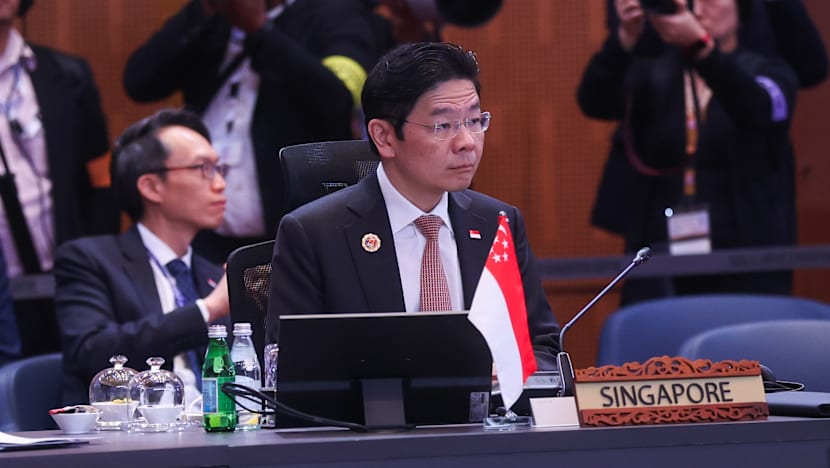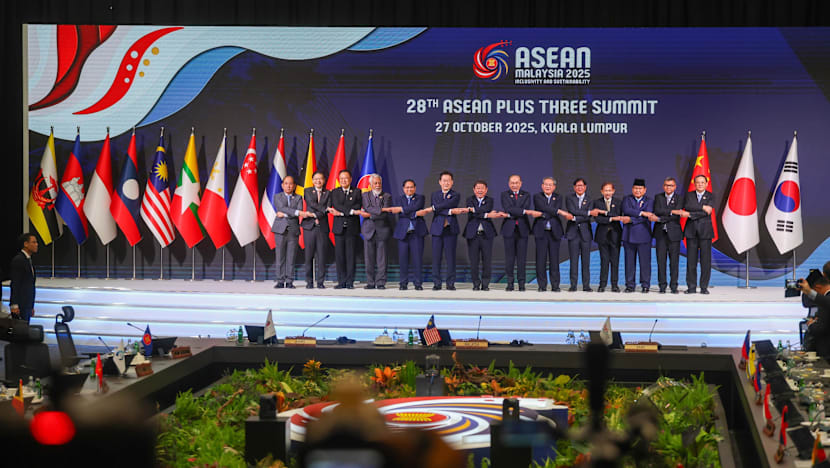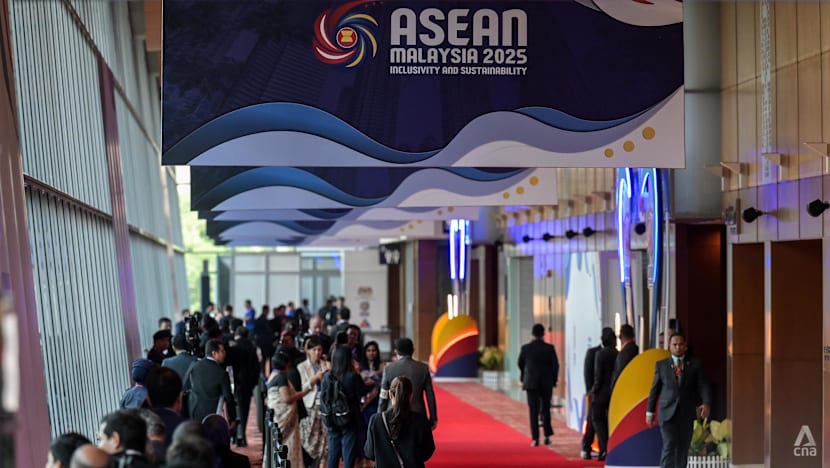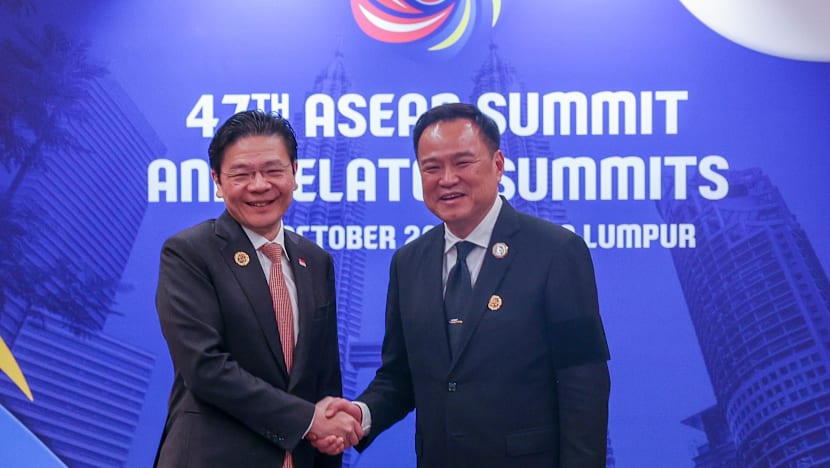RCEP must be fully implemented and stay open to continue achieving full potential, says PM Wong
Singapore's Prime Minister Lawrence Wong called for the trade bloc to stay open and be prepared for expansion, such as the inclusion of new members.

Prime Minister Lawrence Wong attended the 20th East Asia Summit held at the 47th ASEAN Summit on Oct 27, 2025. (Photo: Ministry of Digital Development and Information)

This audio is generated by an AI tool.
KUALA LUMPUR: The Regional Comprehensive Economic Partnership (RCEP) will need to stay open and be fully implemented if it is to continue achieving its full potential, said Singapore’s Prime Minister Lawrence Wong on Monday (Oct 27).
Speaking at the 5th RCEP Summit held at the 47th Association of Southeast Asian Nations (ASEAN) Summit in Kuala Lumpur, Mr Wong emphasised the importance of regional economic cooperation in times of uncertainty.
"In this uncertain environment, it is more important than ever for our economies to come together, to show that free trade can deliver for our people and bring shared prosperity to our region," he said.
RCEP, which came into effect in 2022, is the world's largest trade bloc. Its members are the 10 ASEAN countries, as well as China, South Korea, Japan, Australia and New Zealand.
With the multilateral rules-based trading system under pressure, RCEP "keeps alive the promise that countries can achieve more together than alone", the prime minister said.
It has brought about "real benefits", such as lowering tariffs and harmonising trade rules, he added.
‚ÄúIn doing this, the RCEP sends a very clear and important signal that we have a stake in each other‚Äôs development, that we are committed to rules-based trade ‚Ķ and importantly, that we are committed to keeping the (World Trade Organization) at the core of our multilateral trading system,‚ÄĚ Mr Wong said.
Singapore is deeply committed to the RCEP, he added, outlining three key priorities for maximising the trade agreement's impact.
First, members need to ensure ‚Äúthe full and effective implementation‚ÄĚ of the trade pact by continuing work on issues where consensus was not reached at the conclusion of negotiations.
One such issue is tariff differentials, which is when the same good receives different tariff rates when imported from different countries.
Mr Wong noted that some businesses have cited this as an obstacle to utilising RCEP and members should resolve this expeditiously, alongside other outstanding issues.
Second, he called for RCEP to stay open and be prepared for expansion, such as the inclusion of new economies so long as they meet requirements and standards.
Third, members should continue to improve the trade pact, Mr Wong said, noting that he agreed with comments from fellow leaders on the need for more ambitious services commitments and new rules to cover emerging areas like green and digital economies.
‚ÄúSingapore looks forward to working with participating countries to review the RCEP in 2027, as set out in the agreement, so that we can continue to improve and enhance the RCEP,‚ÄĚ he said.

Earlier at the ASEAN Plus Three meeting on Monday ‚Äď which includes ASEAN member states with China, Japan and South Korea ‚Äď Mr Wong also touched on the importance of regional collaborations.
For example, he highlighted ASEAN's pursuit of a Digital Economy Framework Agreement aimed at spurring deeper digital cooperation across the region.
This provides opportunities for China, Japan and South Korea, whose ‚Äúadvanced capabilities‚ÄĚ put them in a good position to participate in the growth of this sector. More can also be done in the areas of green finance and clean energy, as ASEAN develops a regional power grid, he noted.
Mr Wong also called for quicker economic integration and stronger regional mechanisms and safety nets, such as the Chiang Mai Initiative Multilateralism for financial stability and the ASEAN Plus Three Macroeconomic Research Office for early warning capabilities.
The ASEAN Plus Three mechanism has thus far delivered "tangible benefits", from enhanced regional safety nets to stronger supply chains and better health security, said Mr Wong.
‚ÄúThe ‚Ķ positive agenda and track record puts us in a good position to navigate an increasingly unpredictable and challenging global environment,‚ÄĚ he added.
EAST ASIA SUMMIT MUST BE "MORE THAN A TALK SHOP"
The 20th East Asia Summit (EAS) was also on the list of closed-door meetings that took place on the second day of the ASEAN summit held at the Kuala Lumpur Convention Centre.
In that meeting, Mr Wong stressed the importance of finding common ground and transforming "discussions … into practical outcomes".
The EAS brings together ASEAN member states with eight key partners: Australia, China, India, Japan, New Zealand, South Korea, Russia and the United States.
Established in 2005 in Kuala Lumpur, it was envisioned as a forum to strengthen global norms while promoting peace, stability and economic prosperity in East Asia.
Two decades on, Mr Wong said the EAS "remains the only forum with the ability to convene all the key players" in the region.
"We may have different perspectives in some areas. In fact, we do have different perspectives in some areas but here at the EAS, we can discuss matters of shared concern and shared interest," he said.
This is essential for building trust and paving the way for collaboration in areas ranging from disaster management to combating scams, he added.
But Mr Wong also cautioned that the EAS "must be more than a talk shop".
Members are encouraged to come up with initiatives under the four priority areas of the ASEAN Outlook on the Indo-Pacific, which provides a framework for tangible cooperation.
"We must translate words into actions … if two or more EAS members agree to work together on practical projects, we should support them," he said at the meeting.

Separately at the 15th ASEAN-United Nations Summit, Mr Wong described ASEAN‚Äôs partnership with the UN as ‚Äúa vital anchor for peace, stability and sustainable development‚ÄĚ at a time when the world is facing overlapping crises and multilateralism is under strain.
Areas for closer cooperation include enabling more to tap the benefits of digitalisation by setting global digital rules and standards and keeping cyberspace safe, as well as combating climate change, said Mr Wong.
Both sides can also partner in upholding the global rules-based order, and peace and stability around the world, he added.
For example, ASEAN will work with the UN and external partners to support the cessation of violence, facilitate humanitarian access and create the conditions for multi-stakeholder dialogue in Myanmar.
Singapore also believes that ASEAN can contribute to the development of international law, which is why it nominated Ambassador Rena Lee for election as a judge of the International Court of Justice (ICJ).
There has not been an ICJ Judge from Southeast Asia since the 1970s, said Mr Wong, adding that with Mrs Lee’s track record as an international lawyer and multilateralist, she will be able to contribute her expertise and an ASEAN perspective to the UN’s principal judicial organ.
He also said that the UN will have to evolve to stay relevant in a multi-polar world, while ASEAN, with its experience in managing diversity and consensus-based decision-making, can offer some useful perspectives.
‚ÄúASEAN and the UN share a common belief that cooperation, not confrontation, is the only path to lasting peace and progress,‚ÄĚ Mr Wong said.
“By combining our strengths and efforts, ASEAN and the UN can jointly build a more resilient multilateral system and secure a more sustainable, peaceful and inclusive future for all peoples."

On the sidelines of the ASEAN summit, the prime minister met his Thai counterpart Anutin Charnvirakul, where he expressed his condolences on the passing of former queen Sirikit.
Both countries share a long-standing friendship and close cooperation across many areas, such as digital finance and carbon credits collaboration, Mr Wong said in a Facebook post.
The leaders agreed on the potential for both sides to do more together in new and emerging sectors, Mr Wong wrote, adding that he is looking forward to continuing discussions with Mr Anutin during his introductory visit to Singapore.













